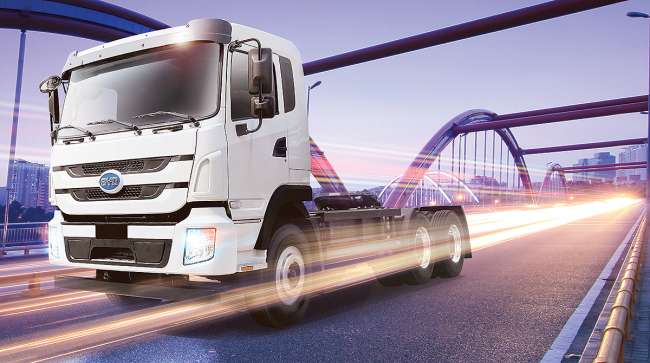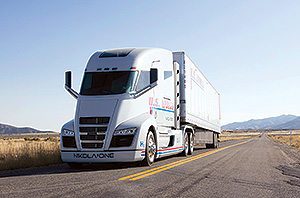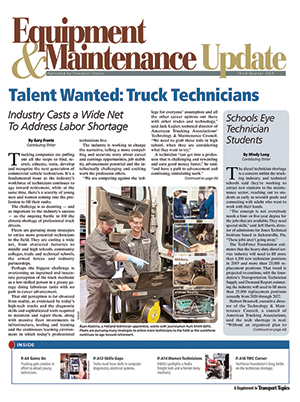Electric Trucks Will Demand New Expertise

[Stay on top of transportation news: Get TTNews in your inbox.]
Electric-powered vehicles are beginning to enter the freight transportation industry, a truly momentous event. Only time will tell, though, what unintended consequences this disruptive technology will have on freight transportation, drivers, vehicle maintenance and maintenance technicians.
Some industry representatives suggest this exciting development will not only reduce diesel pollutants, but also attract a new generation of recruits to the field of heavy truck maintenance.
The advanced technology found in battery-electric and fuel-cell electric trucks by itself, however, will not attract new technicians in the numbers needed.

Hydrogen-electric truck from Nikola by Nikola Motor Co. via YouTube.
As new technology was introduced previously — engine emission controls, vehicle stability systems and the like — industry observers said these new technologies would help fleets, truck dealerships and independent repair shops bring in more skilled technicians. Yet recent government and industry statistics forecast the need for tens of thousands of new technicians. The U.S. Bureau of Labor Statistics said in 2017 that 283,000 automotive and commercial truck technicians would be needed by 2026. Ten percent of those would be truck and bus mechanics. The Technology & Maintenance Council of American Trucking Associations pegged the deficit at 30,000 in 2018.
In the view of Kenneth Calhoun, general chairman and treasurer of TMC, electrification of Class 8 trucks is neither positive nor negative for the industry’s technician situation, “It’s just different.” He is fleet optimization manager at Altec Industries, a vehicle and equipment provider to utility companies and vocational fleets.
“We are pretty good at adapting to change. It doesn’t matter if it is organic, driven by better, more efficient technology, or mandated,” Calhoun said. “We will ramp up as the technology ramps up. Our challenge is to utilize these advancements to motivate more young people to consider our career opportunities.”

- Talent Wanted: Truck Technicians
- Schools Eye Technician Students
- FutureTech Champ Advances Her Career
- Former Army Mechanic Is Now a Truck Tech
- The Technician's Vital Role in Trucking
- Understanding the Numbers Behind the Shortage
- Trucking Gets Creative in Attracting Young Technicians
- Clear Career Paths Needed for Technicians
- Closing the Skills Gap: Techs Must Master Diagnostics, Electrical
Calhoun’s point about ramping up with the technology fits with my assessment that adoption of electric trucks will be painful in the short term, but pay off with operational and maintenance benefits in the long term. Among the painful aspects of their adoption, according to Ryder System Inc., will be new systems and tools to diagnose electric powertrains and new models from new truck makers, including Nikola Motor Co. and BYD North America.
Chris Nordh, senior director of advanced vehicles technologies at Ryder, said it’s not always easy to adopt vehicles from new OEMs, compared with well-established truck builders. The small number of electric vehicles put in operation by fleets can be challenging, due to significant training needs.
Ryder counts 30 EVs among its 83,000 Classes 1-7 trucks and has 1,000 ordered for FedEx. But Nordh said he expects to see several thousand electrics added to the transportation industry in 2020.
Comparing today’s diesel technology to electric trucks, Nordh sees “more positive feedback” from drivers and technicians that could support the premise of the switch to electrics driving more technician recruitment. But it’s too early to tell.
According to Nordh, the industry first will have to survive the new components and systems that will be necessary for vehicles and engines to comply with greenhouse gas emissions in 2021, 2024 and 2027. “That will require more maintenance,” he said.
Currently, Nordh said Ryder’s maintenance costs for engine and exhaust systems account for about 22% of the total vehicle, and he expects the coming EVs to require less powertrain maintenance. “Fewer technicians can handle more vehicles.”
The allure of Class 8 trucks powered by electric powertrains may not be enough on its own to entice greater numbers of individuals to join the ranks of heavy truck technicians. It’s easy to find proponents for the theory, as well as opponents. Some have voiced their beliefs that electric vehicles capable of transcontinental runs could be 20 years off.

Romba
In the meantime, truck builders continue to establish partnerships with technical schools such as Western Technical College in El Paso, Texas, to update courses to address the arrival of electric-powered trucks. These partnerships can only enhance technician education to enable them to enter the workforce prepared for the challenges of Class 8 truck technology, including electric vehicles.
Industry recruiting efforts will be needed to lure the next generation of Class 8 maintenance technicians to work on tomorrow’s electric trucks.
Phil Romba has covered trucks and truck maintenance as a full-time journalist and worked as a public relations manager for Volvo Trucks North America during his 20-year-plus career.




